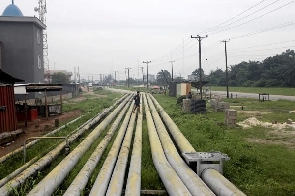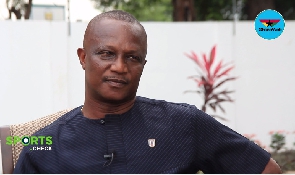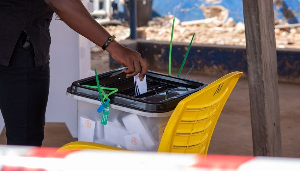On October 30, oil-rich Rivers State, Nigeria’s oil capital, became the latest hub of political drama in the country following the state parliament’s attempted impeachment of Siminalayi Fubara, who had been governor for only five months.
The impeachment notice was signed by 24 of 32 lawmakers, all loyal to Nyesom Wike, Fubara’s predecessor, who was hitherto seen as his “political godfather”. Wike has accused Fubara of wanting to destabilise the structure that brought him to office.
Since then, a political crisis has unfolded, impeding governance in the state and risking crude production in Africa’s largest oil producer.
The parliament complex was burned down; 27 lawmakers defected from the Peoples Democratic Party to the All Progressives Congress – the opposition at the state level but the national ruling party – while the remaining five elected a factional speaker; Fubara presented the 2024 budget to these five lawmakers and nine members of the state cabinet resigned.
The crisis split the parliament into two factions: one backed by Wike, now a federal minister, and the other faction loyal to Fubara. A night before the impeachment attempt, an explosion by unknown arsonists destroyed a section of the legislative complex. During Fubara’s inspection tour of the complex the next day, the police fired tear gas at him.
Nigeria’s President Bola Tinubu met with parties involved in the crisis on December 18. After the meeting, the parties involved reportedly signed a resolution stating that court cases instituted by Fubara be withdrawn and the state parliament drops all impeachment proceedings against him.
Confidence MacHarry, a lead security analyst at Lagos-based consultancy SBM Intelligence, says although the move may be in the interests of peace, such intervention could “end badly.”
“That kind of direct intervention of Tinubu sets a dangerous precedent and people in the state are not taking it quite kindly being that the president is not from the region and he is from a different political party [APC],” MacHarry told Al Jazeera.
He explained that because Wike played a critical role in ensuring the president got the majority of votes from the state during the February 25 election and was then appointed a minister, “people do not think the president would be an impartial arbiter”.
Risk to the economy:
The peace agreement has barely resolved the crisis, creating fears of continued risk to the oil capital, even as Nigeria’s economy, which is overly reliant on oil exports, continues to plummet.
At least 90 percent of the country’s revenue goes to servicing its debt obligations and workers have threatened strikes if there is no pay increase to counter a cost-of-living crisis, worsened by a controversial fuel subsidy ending in May.
For decades, crude oil from the delta has accounted for the majority of the country’s export earnings. Rivers, one of the six states in the region, is home to pipelines that transport crude from other states to its Bonny export terminal. In 2021, the state accounted for 6.5 percent of Nigeria’s entire revenue.
“If the political crisis continues, it could spread to other parts of the Niger Delta which will be more devastating to the economy,” says Gabriel Adeola, a professor of political science specialising in political economy at Crawford University, Ogun State.
Nigeria’s crude production averages 1.25 million barrels per day (bpd), according to data from the Organization of the Petroleum Exporting Countries (OPEC).
Revenue from non-oil outpaced that of oil by 1.5 trillion Nigerian naira ($1.9bn) in 2022, due to factors such as oil theft – which cost Nigeria at least $2bn between January and August 2022 alone and caused oil production to dip.
Still, experts like Peter Medee, associate professor of economics at the University of Port Harcourt, insist that Nigeria cannot thrive on revenue from non-oil sectors alone.
“Oil is the nerve centre of [Nigeria’s] economy … If anything happens to oil production, it means that 60 percent of revenue is gone,” Medee told Al Jazeera.
‘Recipe for disaster’
There are also fears that the political crisis could eventually snowball into an ethnic crisis because of the identity of the main actors. Fubara is Ijaw, Nigeria’s fourth largest ethnicity and spread across the delta while Wike is Ikwerre, the largest ethnic group in Rivers.
Zoning and rotation of positions is an often unwritten rule in Nigerian politics, ostensibly to ensure equality in what is a very diverse society. Until Fubara’s election victory in March, no Ijaw had become governor since the return to democracy in 1999; all three of his predecessors in that time have been Ikwerre.
Already, Ijaws have started drumming support for the governor.
Jonathan Lokpobiri, president of the nationalist Ijaw Youth Council (IYC), said his people were already “worried about the catastrophic effect this crisis may have on Rivers State and the spiral effect it will have on the entire Niger Delta”.
The current developments, Lokpobiri told Al Jazeera, have so far “undermined and insulted the sensibilities of the Ijaw people”.
He said a lack of a fair and lasting solution could force the people to deploy different means in showing support for the governor, warning that interested parties could “go destructive which tends to get attention faster and better”.
“The president’s [actions and inactions] can be a recipe for disaster not just in Rivers State but the Niger Delta,” he warned. “If this issue is not managed and the president thinks it does not affect him, it will affect the oil industry.”
This could lead to an armed revolution, says Medee.
“People revolt in their area of advantage and one of their [Ijaw people] area of advantage is the oil pipeline that carries crude from other parts of the state through Ogoniland in Rivers …they could cut it off,” he told Al Jazeera.
‘A multiplier effect’:
In the early 2000s, Niger Deltan youths, aggrieved by the economic marginalisation and environmental degradation of the region despite being the source of oil wealth, banded together into armed groups. They infamously destroyed oil pipelines and abducted oil companies’ employees. These attacks reduced oil production significantly, costing Nigeria a fifth of its production.
This continued for years until a 2009 presidential amnesty directive granted unconditional pardons and gave cash payments to rebels who agreed to turn in their arms.
“If the [rebels] boys start again, it will hamper oil production and our calculation will fall short of expectation,” Adeola said.
Since the amnesty, the armed struggle in the delta has quietened partly because of surveillance deals granted to some former rebel leaders but also because of illegal small-scale refineries operated in parts of the region.
But experts like Obemeata Oriakpono, a reader in environmental health and toxicology at the University of Port Harcourt, said the political crisis could reignite that conflict and cause environmental damage that “cannot be quantified”.
“If the conflict degenerates more, it will be a multiplier effect,” he said.
Meanwhile, oil spillage resulting from sabotage could compound a continuing cleanup in Ogoniland, an area of 1,000sq km (385sq miles), which has historically been the epicentre of oil spills in the delta.
So Lokpobiri hopes the crisis is resolved permanently. “Our goal is not victory over one but a peaceful reconciliation,” he said but warned that “[the] Ijaw nation will never allow [the governor] to be impeached. He must complete his [four-year] tenure.”
Click to view details



Africa Business News of Wednesday, 27 December 2023
Source: aljazeera.com

















